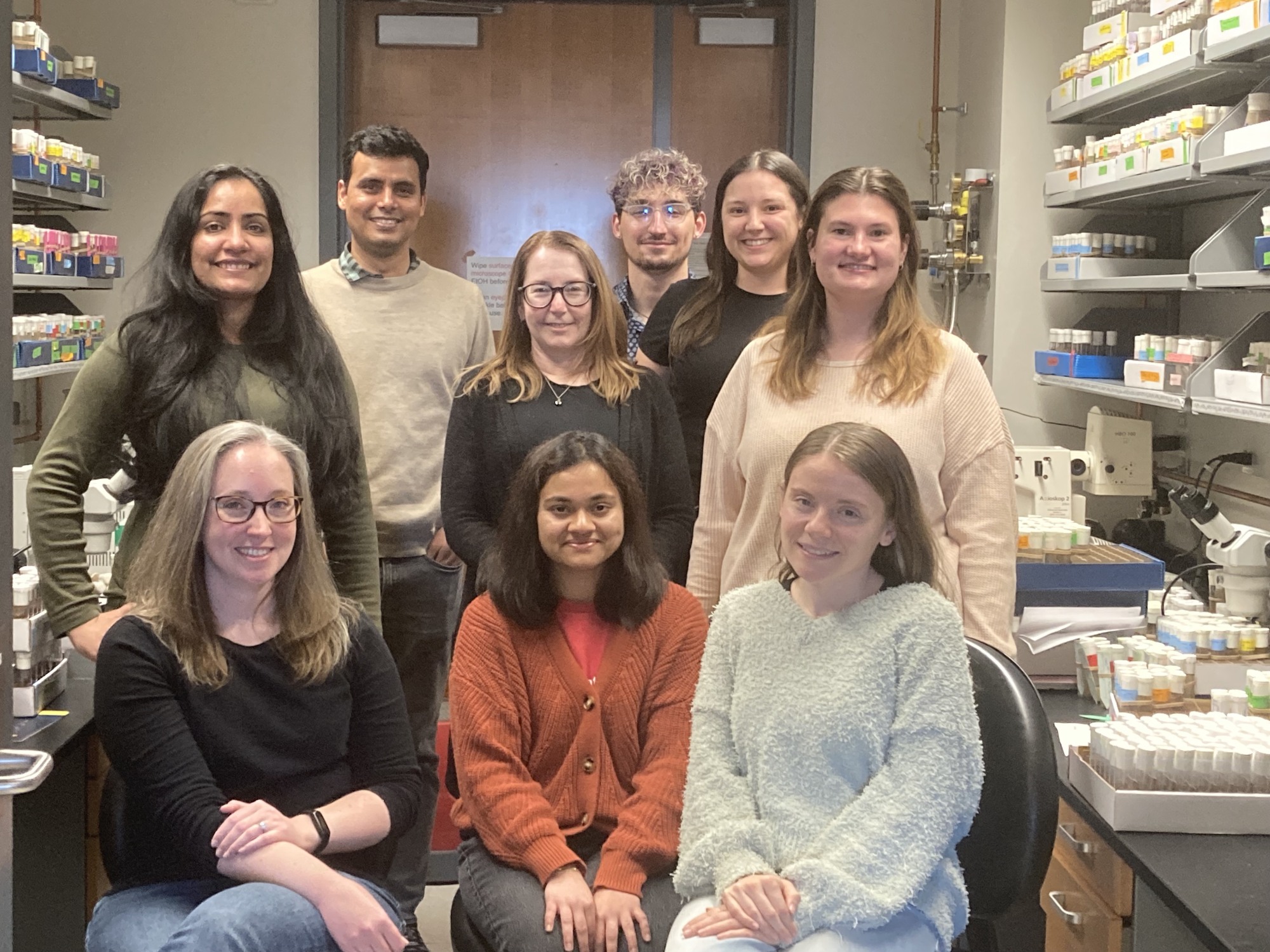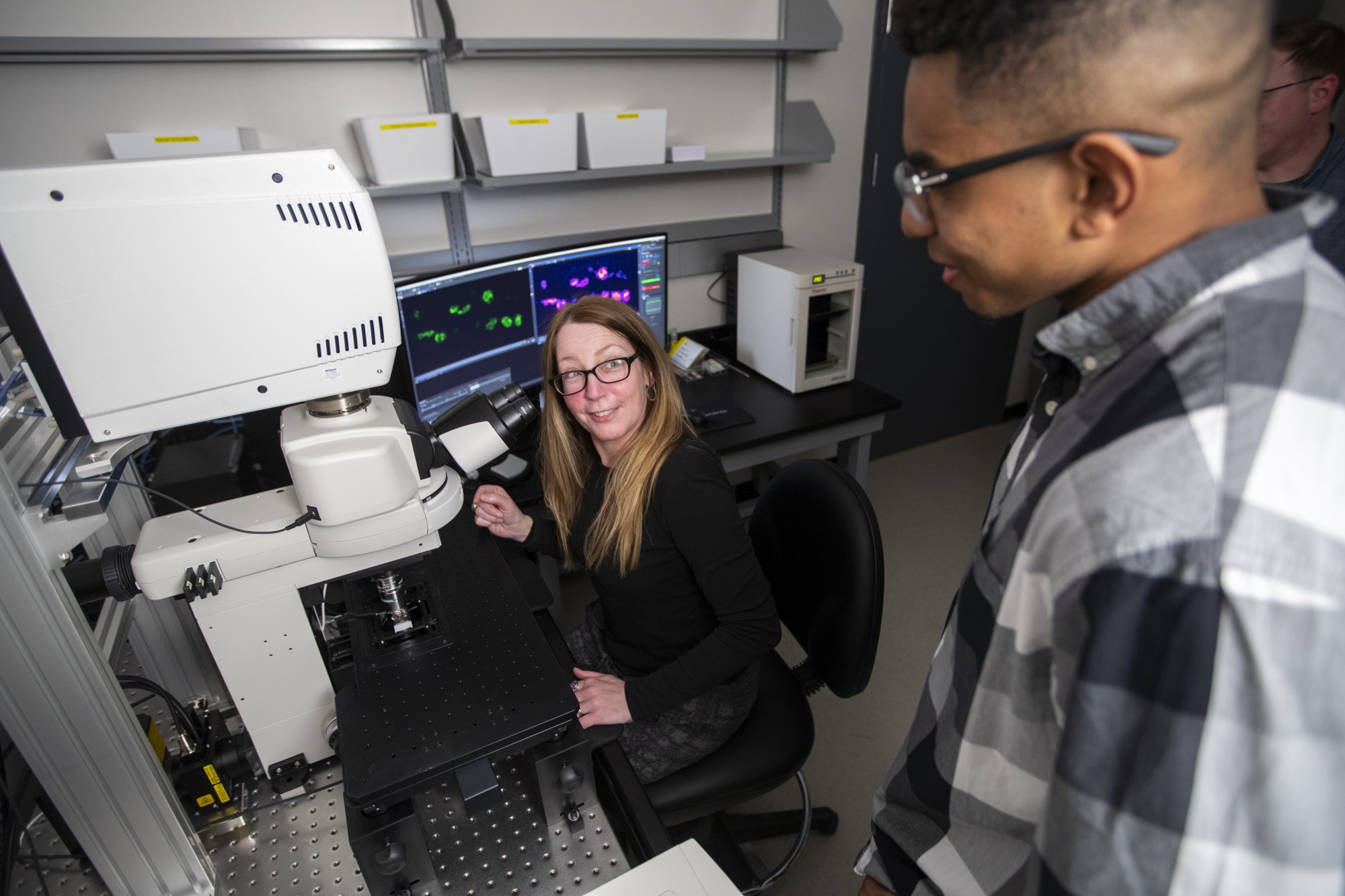Neurobiologists with the Robert J. and Nancy D. Carney Institute for Brain Science have discovered how genetic variants that alter an enzyme called ALKBH8 might cause certain rare intellectual disabilities. These disabilities, which have been found so far in six families, are characterized by delayed development and impaired learning.
The really exciting thing, said lab leader Kate O’Connor-Giles, is that her team has also learned that giving antioxidants to fruit flies genetically modified to model these intellectual disabilities reverses the flies’ memory and learning problems. Results of the research were published Nov. 4, 2024 in a special issue of the Proceedings of the National Academy of Sciences.
“While there’s still a lot of work to be done, our findings suggest antioxidants could be a beneficial treatment for individuals with ALKBH8-associated intellectual disabilities,” said O’Connor-Giles. “Together with our collaborator, RNA biochemist Dragony Fu at the University of Rochester, we’re moving ahead with experiments in human neurons to further test the effect of antioxidant treatment.”

O’Connor-Giles, Provost’s Professor of Brain Science at Brown University and associate director of the Center for the Neurobiology of Cells and Circuits at Carney, conducts research using fruit flies because they are easy to genetically alter, and they share with humans many of the same genes responsible for neuron development and function. The team alters genes in flies using the gene-editing tool CRISPR. They then study how these gene edits impact the fly nervous system.
ALKBH8 is part of a family of enzymes that modify an RNA known as tRNA, or Transfer RNA, so called because it helps transfer the genetic instructions to make new proteins. Because tRNA regulation is understudied in the brain, the lab was eager to get out its CRISPR toolkit and modify ALKBH8 in fruit flies.
Kimberly Madhwani, a recent graduate of Brown’s Neuroscience Graduate Program, took the lead in investigating ALKBH8. In order to model the variants of ALKBH8 linked with intellectual disabilities in humans, she removed, or “knocked out,” the normal variant of ALKBH8 in a fruit fly. (Knocking out ALKBH8 is a useful proxy for intellectual disability-associated variants of ALKBH8 because research has shown these variants do not do anything.)
What Madhwani found was that when she knocked out ALKBH8, it changed how fruit flies form synapses, the sites where neurons connect and communicate with each other. Without ALKBH8, neurons formed too many synapses. Altered synapse number or function is a feature of many intellectual disabilities.
Madhwani went on to establish that ALKBH8 limits the number of synapses that neurons form by helping to make antioxidant proteins called selenoproteins. Without selenoproteins and the other antioxidants they regulate, byproducts produced by normal cellular reactions build up, causing what’s known as oxidative stress. Research shows that high levels of oxidative stress change many cellular processes, including signaling pathways that promote synapse formation.
To gauge the effects of removing ALKBH8 on fly learning and memory, Madhwani teamed up with Brown undergraduate Shanzeh Sayied, now a medical student at Albert Einstein College of Medicine, and Carlson Ogata, a Brown senior who’ll attend the Warren Alpert Medical School of Brown University next year.
The trio leveraged fruit fly food preferences to conduct their experiments. When fruit flies stumble upon bitter foods like coffee or citrus, they won't return for a second taste. Flies can normally be trained to associate cues with bitter taste, but when ALKBH8 knockout flies were trained, they would keep reaching out for another taste of the bitter solution. The team established that the gene-edited flies couldn’t remember the association between the cue and bitter taste - a sign of difficulties with learning, forming memories or both.
Now that the team could model learning deficits in the fruit fly, they tried to see if they could “rescue” learning and memory in their gene-edited flies. When Madhwani gave chemical antioxidants to developing ALKBH8 knockout flies, their ability to learn and remember changed. They went on to behave normally when they were given the bitter taste test.

O’Connor-Giles said that the critical next step is to establish whether providing antioxidants to mature flies has a similar rescuing effect. Her lab is currently running these types of experiments, and O’Connor-Giles says the new Brown RNA Center, helmed by tRNA modification expert Juan Alfonzo, will also be key as the work moves forward.
The lab is also collaborating globally to investigate other tRNA-modifying enzymes with links to intellectual disability. Jennifer Dumouchel, a PhD student who received a 2024-2025 Carney Graduate Award, leads these efforts in the O’Connor-Giles lab as her dissertation project.
“There is a whole family of these tRNA-modifying enzymes that haven’t really been studied in the nervous system,” Dumouchel said. “We think that by combining our studies in fly models with the Fu Lab’s studies in human neurons, we’ll be able to really find out in great mechanistic detail what's going on. And with that knowledge, we hope to identify therapeutic paths for a number of these rare intellectual disabilities.”
This research was funded by awards from the National Institute of Neurological Disorders and Stroke, National Institutes of Health (R01NS117068 and F99NS129128). Jennifer Dumouchel's work is supported by the Brown University Predoctoral Training Program in Transdisciplinary Pharmacological Sciences (T32 GM077995) and the JBB Endowed Graduate Fellowship in Brain Science Carney Graduate Award.